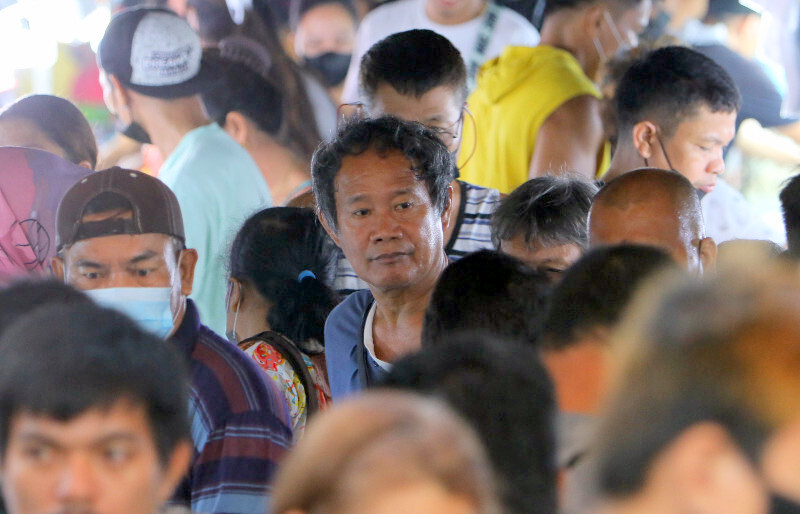Different government agencies advised the public to continue wearing face masks following the order that made it voluntary.
In separate statements, the agencies cited the recent uptick in COVID-19 cases and the risk of transmissions in crowded outdoor areas as their reasons for maintaining the face mask policy.
Several Filipinos, personalities and doctors have also advocated keeping the protective equipment on for the welfare of others and themselves.
RELATED: ‘Wear it for others’: Doctors, Romnick Sarmienta prefer to keep face masks on outdoors
Advice from government agencies
Department of Health
Health undersecretary Maria Rosario Vergeire said the voluntary use of face masks can only be done in low-risk settings.
“Ang tanungin natin lagi, at bibigyang paalala ng Kagawaran, kailan ba safe magtanggal ng mask? Ito pong optional use of mask outdoors ay doon lamang po sa mga low-risk settings and among low-risk individuals,” Vergeire said in a statement.
The health official also pointed out that an area should meet the following conditions first before a person can remove his or her face mask:
- Not crowded
- Not congested
- With good ventilation
Vergeire further stated that the change in protocol is only applicable to healthy individuals who are younger than 60 years old and are vaccinated and boosted.
She also highlighted the importance of face masks as a preventive measure against COVID-19.
“Ang ating message na gusto po nating iparating araw-araw sa inyo is that the mask will always be our default. Ang atin pong responsibilidad sa ating sarili, pati na rin sa ating pamilya at komunidad, ay lagi nating ia-assess. Ibig sabihin, ang mask, kapag alam natin na mataas ang risk natin, isusuot natin,” Vergeire said.
Transport agencies
The Department of Transportation and the Metropolitan Manila Development Authority encouraged the use of the face accessory for commuters and their field personnel, respectively.
In a statement to reporters, DOTr cited the latest COVID-19 tally as its basis.
“The Secretary favors maintaining the face mask protocol in all public transport because prevailing infection numbers show the virus has not been fully controlled and we should not let our guard down,” the agency was quoted in a report as saying.
The DOTr has its own “seven commandments” that the public is required to adhere to in COVID-19 prevention in public transport. These are the following:
- Wear masks.
- Do not talk or make phone calls.
- Do not eat.
- Keep public utility vehicles well ventilated.
- Conduct frequent disinfection.
- No passengers with COVID-19 symptoms are to be allowed. inside the public transportation.
- Observe appropriate physical distancing.
In a separate statement, MMDA Acting Chairman Carlo Dimayuga III encouraged field enforcers to continue wearing the protective equipment for the following reasons:
- COVID-19 prevention
- Prevention of pollution
“I support President Ferdinand ‘Bongbong’ Marcos Jr. on optional wearing of face masks outdoors, but with regards to MMDA traffic enforcers on the field, I encourage them to still wear masks as prevention from pollution emitted by vehicles along major thoroughfares,” Dimayuga said.
“Traffic enforcers and street sweepers face the risk of acquiring respiratory illnesses in the performance of their duties. To protect their well-being, we highly encourage them to continue wearing face masks because their health is of utmost priority to the agency,” he added.
Clarifying the order
Joey Concepcion, Go Negosyo founder and former presidential adviser on entpreneurship, stated that what changed is the “mandate” itself.
RELATED: Public reminded of risks as gov’t OKs voluntary face mask removal outdoors
Executive Order No. 3 did not remove the use of face masks altogether.
“What we pushed for was the removal of the mandatory wearing of face masks in outdoor settings. We are still encouraging the use of face masks outdoors, especially for those who are at high risk, like the elderly, the immunocompromised, and especially the unvaccinated,” he said in a statement.
Concepcion also dismissed doubts that the new health protocol will have marginal effects on the economy.
“Tourism is one of our biggest advantages. Our warmth, our smiling people are our assets. We should not lose this advantage. We have so many MSMEs, especially in the provinces, who rely on tourism,” he said.
Concepcion, also the head of the Jobs Committee of the Private Sector Advisory Council (PSAC), further expressed confidence that the Filipino people know how to keep their loved ones safe during the pandemic.
“I believe people are aware of the risks; I think we should give them some credit that they know the risk levels they can safely handle,” he said.

